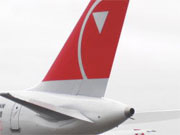 |
| AMFA union spokesman Jeff Mathews emerged from Thursday evening's negotiations with Northwest Airlines, but said little about the airline's new offer. It reportedly calls for eliminating up to two-thirds of mechanics' jobs. (MPR Photo/Jeff Horwich) |
Minneapolis, Minn. — After nearly 10 hours of talks, a Northwest spokesman emerged from the Radisson Plaza Hotel in downtown Minneapolis, saying only that talks had ended and would resume Friday.
One of the top negotiators for the Aircraft Mechanics Fraternal Association, Jeff Mathews, emerged half an hour later to offer slightly more detail.
"We received a written proposal from the company, and the AMFA negotiating committee has been analyzing that information throughout the evening," said Mathews.
According to Matthews, negotiations began with the two sides simply talking. The union asked the airline to put its offer down on paper. Matthews declined to say anything about the proposal, including whether it was better or worse than the last offer the union faced as the strike began Aug. 19.
"I'm not really at liberty to discuss the details, up or down, forward or backward, on the proposal at this time," Mathews said.
In a letter to the union earlier this week, Northwest warned any offer now would cut deeper than its last one. Details about the new offer that reportedly leaked Thursday night, during the negotiating session, seem to suggest this.
News reports quote a top mechanics union official in Duluth, saying the proposal would cut about two-thirds of mechanics' jobs, leaving Northwest-employed mechanics only in the Twin Cities, Detroit, and Duluth.
The official put Northwest's new annual savings target at $203 million -- up from the $176 million the company had previously said it needed from the union. Union negotiators in Minneapolis declined to confirm any of these numbers.
Gary Chaison, a professor of labor relations at Clark University in Massachusetts, says the union may be feeling pressure to accept deeper cuts since the strike has largely unfolded in Northwest's favor. Northwest has also warned it could begin replacing union jobs with permanent replacement workers as soon as Tuesday.
But Chaison cautions that even though union leaders are reviewing the latest offer, they may still have reason to hold out and hope Northwest goes into bankruptcy.
"A bankruptcy judge would do an analysis of the situation and probably be more benevolent. The reason I says that is because what Northwest is asking for is fairly drastic," says Chaison. "It's not only a substantial cut in pay, but a substantial cut in jobs as well. A bankruptcy judge might take a more lenient view and look at the overall package."
Union negotiators also face a basic numbers problem: If they agree to let union members vote on a deal that eliminates more than half their jobs, its chances of majority approval would seem slim. This difficulty may be overcome by sweetening the pension and severance deals for those who would lose their positions.
Chaison says Northwest needs to maintain a hard line with the mechanics because its battles with other unions are just now heating up.
Beyond any savings from mechanics, the airline says it needs more than $500 million in additional annual savings from pilots, flight attendants, and other workers to keep it out of bankruptcy. Chaison says compromising with AMFA at this point would send the wrong message.
"Northwest has essentially given word to its unions that it wants a certain package of concessions or it's willing to do what it did to AMFA, to take a strike and work through it," says Chaison.
Chaison says whatever is going on behind closed doors in the negotiations, the public is witnessing a turning point in labor relations in the airline industry.
In traditional negotiations, he says it is a union that will make an offer, and a company that tries to scale that offer back. At Northwest, the bargaining process has been thrown into reverse. The company demands cuts, and unions fight to hang onto whatever they can.
For Northwest mechanics, the reverse bargaining resumed at 9 a.m. Friday.





